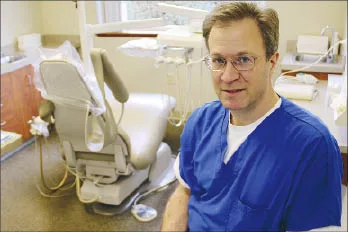
Home » Dentistry, general medicine to overlap more in the future
Dentistry, general medicine to overlap more in the future
Professionals, politicians pursue steps to address access-to-care dilemma

February 24, 2011
In the future, don't be surprised if a physician asks to look in your mouth. Likewise, don't be alarmed if a dentist wants to test for diabetes.
While general health and dental health historically have been diagnosed and treated in a mutually exclusive manner, physicians and dentists likely will receive some training in their counterparts' field and, at a minimum, perform some tests and screenings in the future.
"I see it (dentistry) becoming more and more a part of conventional medicine," says Dr. Jim Sledge, a retired Spokane dentist who teaches first-year University of Washington dental students at Spokane's Riverpoint Campus.
This assessment from Sledge and others in the dental community here comes amidst mounting evidence that oral-health problems are linked to general-health problems. Studies have linked gum disease, for example, to heart disease, diabetes, and certain forms of cancer.
"They're finding more about the correlation between the mouth and the rest of the body," Sledge says. "That sounds like a no-brainer, but for many years, there's been dentistry and there's been medicine."
Dr. Ron Inge, medical director and vice president at Seattle-based Washington Dental Services, says that in that environment, dental practices of the future will expand to offer—and be reimbursed for—early-stage screening tests that currently are handled in physicians' offices.
"It's one more arrow in the quiver to deliver overall better health," Inge says.
While Inge foresees more dentists performing tests conventionally conducted in a physician's office, Sledge is hoping to see more physicians, specifically pediatricians, checking oral health. Sledge points out that most children don't see a dentist until they are 2 years old or older, and they will see a physician six to 10 times before the first trip to the dentist. Consequently, he has been teaching pediatricians and other physicians how to perform a basic oral examination. If such examinations become prevalent, he says, "We can intervene early, when it's not costly and serious."
Dr. Blake McKinley, owner of Spokane Endodontics PS and president of the Spokane District Dental Society, says preventive care has been a "hallmark" of dentistry dating back to the 1950s, and declines in decay rates and cavities for adults in their 20s, 30s, and 40s suggest that those efforts have been successful.
Much of that success is attributed to the dental community's promotion of routine cleanings and checkups and the widespread fluoridation of municipal water supplies and toothpastes. Spokane-area water systems don't incorporate fluoride, but pediatricians and dentists alike recommend it and prescribe it separately.
Since fluoride emerged as an effective tool in fighting tooth decay, though, Sledge says there really haven't been any new advances that help dentists fight oral disease, but a lot of research is under way in the dental field.
"My hope is we'll have another tool to use in the next five to 10 years," Sledge says.
While prevention efforts have been effective historically, a slight uptick in cavities among children ages 4 through 6 the last few years is of concern to the dental community, and a couple of factors could be contributing to that trend reversal.
Sledge says the increase in cavities likely is tied to children's diets that include a prevalence of sugary drinks and snacks.
Inge attributes the rise in decay rates to an increase in uninsured and underinsured families that aren't getting the regular checkups they should. He hopes to see better access to care for uninsured families in the future.
Access to care
Access to dental care is an issue state legislators have taken up in recent years throughout the U.S. in the form of creating a new category of oral-care provider that would require less education than a dentist but would be able to perform some of the same procedures. In Washington, McKinley says, the Legislature is considering a bill (House Bill 1310) that would create two new dental professions, dental therapist and advanced dental therapist. He says that as the bill is currently written, after successfully completing two years of training, such professionals would be able to remove decay, place fillings, and extract teeth, among other tasks without a dentist's supervision.
Eastern Washington University's School of Dental Hygiene has supported the legislation, saying it would provide greater access to care and an affordable alternative for those who don't have dental insurance. Many dentists and dental groups in Washington state, however, have opposed the legislation.
"It just doesn't make sense to minimize education and maximize responsibility," McKinley says. "To give someone with minimal honing the ability to practice and to do irreversible procedures isn't beneficial to the citizens of the state."
Sledge says dentists, as a whole, supported a similar measure a few years ago that involved the creation of an expanded-function dental assistant. That measure passed and allows dental assistants to take a year of additional training that would allow them to fill a cavity once a dentist had cleared the decay area. The distinction, Sledge says, is that an expanded-function dental assistant works under the supervision of a dentist, while a dental therapist could operate independently.
Wisconsin was the first state to establish the dental therapist position, McKinley says, and Alaska also has adopted a dental-therapy program similar to the one proposed in Washington. A handful of other states either have created similar positions or are considering doing so, and if the Washington legislature doesn't pass the measure during the current session, McKinley says he expects it to come up again.
"When you're asking about five to 10 years from now," McKinley says, "dental care could look a lot different depending on what the legislators do."
Latest News
Related Articles


_web.webp?t=1769673727)
_web.webp?t=1769673728)
_web.webp?t=1769673735)
